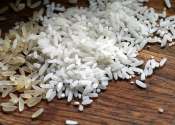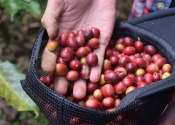Coffee is a brewed beverage prepared from roasted seeds, commonly called coffee beans, of the coffee plant. Due to its caffeine content, coffee can have a stimulating effect in humans. Today, coffee is one of the most popular beverages worldwide.
It is supposed that the Ethiopians, the ancestors of today's Galla tribe, were the first to have discovered and recognized the energizing effect of the coffee bean plant. However, no direct evidence has ever been found revealing exactly where in Africa coffee grew or who among the natives might have used it as a stimulant or even known about it there earlier than the seventeenth century. The earliest credible evidence of either coffee drinking or knowledge of the coffee tree appears in the middle of the fifteenth century, in the Sufi monasteries of the Yemen in southern Arabia. From Yemen, coffee spread to Egypt and Ethiopia, and by the 15th century, had reached Armenia, Persia, Turkey, and northern Africa. From the Muslim world, coffee spread to Italy, then to the rest of Europe, to Indonesia, and to the Americas.
Coffee berries, which contain the coffee bean, are produced by several species of small evergreen bush of the genus Coffea. The two most commonly grown species are Coffea canephora (also known as Coffea robusta) and Coffea arabica; less popular species are Liberica, Excelsa, Stenophylla, Mauritiana, Racemosa. These are cultivated primarily in Latin America, Southeast Asia, and Africa. Once ripe, coffee berries are picked, processed, and dried. The seeds are then roasted, undergoing several physical and chemical changes. They are roasted to varying degrees, depending on the desired flavor. They are then ground and brewed to create coffee. Coffee can be prepared and presented in a variety of ways.
Coffee has played an important role in many societies throughout history. In Africa and Yemen, it was used in religious ceremonies. As a result, the Ethiopian Church banned its secular consumption until the reign of Emperor Menelik II of Ethiopia. It was banned in Ottoman Turkey in the 17th century for political reasons, and was associated with rebellious political activities in Europe.
Coffee is an important export commodity. In 2004, coffee was the top agricultural export for 12 countries, and in 2005, it was the world's seventh-largest legal agricultural export by value.
Some controversy is associated with coffee cultivation and its impact on the environment. Many studies have examined the relationship between coffee consumption and certain medical conditions; whether the overall effects of coffee are positive or negative is still disputed.









